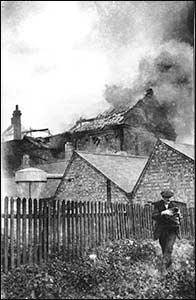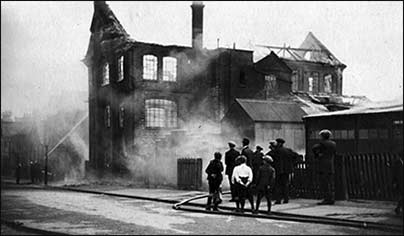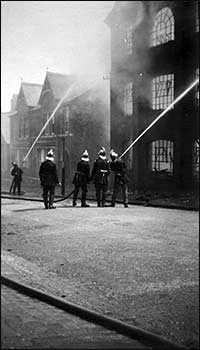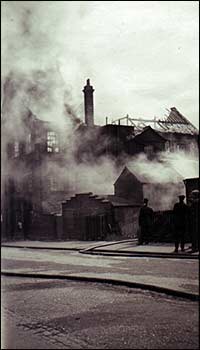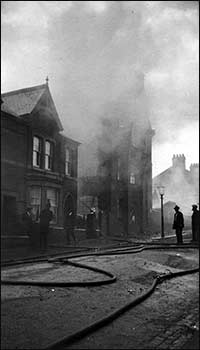|
|||||||||||
| The Rushden Echo, 5th August, 1921, transcribed by Gill Hollis |
|||||||||||
|
Messrs. Jaques & Son’s Factory Gutted
|
|||||||||||
|
Alarming Fire at Rushden - Fire Brigade’s Heroic Work |
|||||||||||
|
|
|||||||||||
|
Adjoining Buildings Saved - Splendid Supply of Water Available |
|||||||||||
|
Unfortunately it was a long time before the Fire Brigade Steamer could get on the scene owing to the loss of time in getting horses to the Fire Station. Had there not been a good pressure of water (from a hydrant in High-street) the spreading of the fire would have been inevitable. At one time some sacks and other dry material on Messrs. Jaques and Clark’s factory had caught fire, and for a few moments the Brigade directed water on to it to prevent further damage. At intervals, with terrific roars and with tremors that could be felt hundreds of yards away, roof, machinery, and wall fell in. Then the flames, which had at one time reached to a height of 30 or 40 feet above the roof, died down, and by noon were well under control. Thousands of people witnessed the destruction almost from beginning to end. Mr. Harry Jaques (the principal of the firm) was an early arrival, and watched from the Carnegie-street allotments. Mrs. Jaques came shortly afterwards. The Brigade toiled ceaselessly for hours around the walls of the factory, and by about 2 pm it was possible to ascend - by means of the fire escape - and attach ropes to pull down the loose and slanting brickwork. This provided interest for hundred of on-lookers (and not a little amusement when a breaking rope caused the firemen some score of yards away to fall incontinently into a wriggling heap!) Between 4 and 5 pm access to the inside of the walls was possible and the safes were opened, fortunately having preserved the ledgers, etc., intact. Mr. W. McHorrell motored Mr. Jaques with the books to “Erskine House” (Mr. Jaques’s residence.) The thousands of pounds damage is, we understand, covered by insurance, and although the firm had a good number of orders it will necessarily take a few weeks to find accommodation for the employees. Much valuable property surrounds the factory of Messrs. Jaques & Son, including St. Peter’s Church, Zion Baptist Chapel, the large and important factory of Messrs. Jaques & Clark, several shops, and private houses, and to the heroic work of the firemen must be attributed the fact that the property was saved, considering that every condition was favourable to the spread of the conflagration - the dryness of everything, the heat, and the wind. Happily there was an abundant supply of water available, and the people of Rushden have real reason to be thankful for the success of the local water scheme. Had such a fire taken place in most towns in England at a time of prolonged drought and excessive heat it could never have been confined to one building. The cause of the fire is not known. The engineer, Mr. Robinson, and his assistants had been at work on the ground floor up to 10.45, but the fire started in the top floor. Much sympathy has been extended to Messrs. Jaques and Son in the disaster. Other manufacturers have volunteered to help the firm to meet their orders, which just now are numerous. It is hoped that many of the workmen will soon be found employment. In regard to the belated arrival of the Steamer, an excellent suggestion has been made that one of the Council motor vehicles should be used to take the Steamer to a fire. By adjusting the front part of the Steamer for the motor vehicle instead of for horses, this seems possible. The firemen found it necessary on Monday morning to play upon some burning material, and they directed upon it a good stream of water, until at last everything was safe. All employees are requested to attend at the Trade Union Office, on Monday next, August 8th, at 9 am prompt. Mr. H. Jaques will attend at the Trade Union Office on Monday morning next, Aug. 8th, at nine o’clock, to place the position before the employees of the firm.
|
|||||||||||
|
|
|||||||||||
